Story update: Workers Defense released its candidate endorsements:
Mayor: Steve Adler
District 1: Lewis Conway Jr.
District 3: Sabino “Pio” Renteria
District 5: Ann Kitchen
District 8: Bobby Levinski
District 9: Kathie Tovo
Hardball politics and financial muscle achieved gains to support worker goals
Posted Monday August 27, 2018 10:59am
Updated Monday August 27, 2018 3:42pm to post endorsements
Updated Tuesday August 28, 2018 11:24am to add information about Ann Kitchen’s organization, TexHealth Central Texas
 Twenty-one of the 28 candidates on the November ballot for mayor or city council showed up at the Workers Defense Action Fund forum Sunday August 19, 2018, to make a pitch for the group’s endorsement. As of this morning, a spokeswoman said the group has not released its endorsements.
Twenty-one of the 28 candidates on the November ballot for mayor or city council showed up at the Workers Defense Action Fund forum Sunday August 19, 2018, to make a pitch for the group’s endorsement. As of this morning, a spokeswoman said the group has not released its endorsements.
All 21 candidates signed a handmade poster labeled, “I commit to the Build a Better Austin Pledge.”
The pledge (linked at the bottom of this story) details a six-point plan to raise construction working standards, implement and expand the Freedom Cities policies, implement the paid sick leave policy and create a department to enforce it, support immigrants in deportation proceedings, and implement policies to care for injured workers.
Freedom Cities is a campaign devised by the ACLU that seeks “municipal opposition to, or lack of cooperation with, the Trump administration” policies of mass deportation. The Austin City Council drew praise from Progress Texas for becoming the first “Freedom City” in Texas by unanimously passing two resolutions June 14, 2018 (Agenda Items 73 and 74) that “target racial disparities in Austin police arrests and guide how law enforcement should interact with immigrants.”
The Workers Defense Action Fund is the political arm of Austin’s Workers Defense Project. Workers Defense has scored local political victories through City Council approval of policies governing expedited permitting and steamrolled opposition to enact a paid sick-leave ordinance that applies to every private employer.
The latter win was rammed through in record time and the lack of due process was one factor in triggering litigation. The sick-leave ordinance was to take effect October 1. But a lawsuit filed by the Texas Association of Business and 10 other business-related plaintiffs, joined by the State of Texas as intervenor, succeeded August 17, 2018, in getting the Third Court of Appeals to temporarily block implementation while the case proceeds. (Third Court of Appeals Case No. 03-18-00445-CV.)
Workers Defense pays to play
Candidates love to rack up a long list of organizations that endorse their bids for public office. Many local organizations that host candidate forums and make endorsements do little more than encourage their members to personally contribute to the endorsed candidates. Workers Defense does more than that.
The Workers Defense Action Fund is registered with the Texas Ethics Commission as Workers Defense in Action, a general-purpose political action committee (PAC). Its latest campaign finance report filed July 18, 2018, shows the group received $25,000 in contributions from the Washington, DC-based United Food and Commercial Workers Union and had more than $52,000 in cash on hand.
Candidates on the ballot this year drew four-year terms when the 10-1 council was established in January 2015. Those who drew two-year terms faced reelection in 2016 for a new four-year term. In that election, the Workers Defense in Action PAC spent a total of nearly $33,000 in September, October, and November 2016 in support of endorsed candidates, according to reports filed with the City Clerk. These were direct campaign expenditures—made without the candidates’ prior consent, cooperation, strategic communication or consultation—that paid for campaign workers, printing and supplies.
All five candidates backed by Workers Defense won in 2016, resulting in the defeat of two Republicans on the council, Sheri Gallo in District 10 (by Alison Alter) and Don Zimmerman in District 6 (by Jimmy Flannigan).
So far this year, the PAC has not filed a campaign finance report with the City Clerk but likely will if it follows the pattern established in 2016.
Questions asked for ‘yes’ or ‘no’ answers
Candidates for each position on the ballot were grouped and questioned separately. After candidates made brief self-introductions, a group of panelists posed questions, first in Spanish, then English. Candidates were asked to answer questions with a clear “yes” or “no” and then had 30-60 seconds to elaborate. The questions were read from a script, indicating the group had spent significant effort in preparing to grill the candidates. The bilingual format and sometimes halting reading of questions combined to make for a thorough, albeit slow-paced, three hour event.

Mayor Stephen Ira “Steve” Adler, who is 62, said the current council is the “most supportive of immigrant families of any council.” He noted the council was raising city employees to a minimum wage of $15 an hour, worked on homelessness, and has an affordable housing bond slated for the November election.
Laura Caldwell Morrison, 63, is a former two-term council member who left office at the end of 2014. On her ballot application she described herself as a “community advocate.” She said she is running for mayor “because I’m concerned now many more people are struggling in this town and feeling like there’s no future for them.”
Travis Ryan Duncan, a 29-year-old artist, was the only candidate who responded to questions in Spanish. He said he’s running because he is concerned about people in Austin struggling economically. He said his family has been in Texas “nearly 200 years” and he claimed to be the first mayoral candidate pushing for “universal healthcare.”
Pedicab driver Alexander Philip Strenger, 32, made sure he stood out by climbing to the podium wearing a large and gaudy belt adorned with a foot-high plate engraved with “MAYOR.” He placed it prominently on the table next to his microphone. He even insisted he was “ahead in the polls.” This despite the fact his campaign reported having spent just $1,215 through June 30, compared to more than $236,000 spent by Adler and $44,000 spent by Morrison through that date, according to campaign finance reports. Duncan had spent just $45.
To the question of whether the sick-leave ordinance should apply to workers regardless of the size of the company for which they work, all but Strenger agreed. He said that there “should be a minimum number of workers to implement that” and startup companies needed time to reach profitability. Duncan said it was only a “baseline” for what’s needed now, but he advocates “worker-owned cooperatives.”
Adler said he voted for the sick-leave ordinance and has worked with mayors of San Antonio and Dallas to expand the program. (Bloomberg News reported the San Antonio City Council passed a mandate August 16, while a petition for paid sick leave in Dallas had failed in July.) Morrison said as mayor she would “vigorously defend” the ordinance. Duncan said there should be employer incentives rather than penalties.
Noting that Texas employers are not required by law to provide workers compensation insurance, candidates were asked what they would do to help workers injured on the job.
Adler said he advocated a “workers injury fund.” Strenger proposed tax breaks for employers who provide workers comp insurance. Duncan said, “When we have worker-owned cooperatives we will not have these problems.”
Asked about minimum wages, Morrison said when the wage should be indexed to rise with inflation, adding that city retirees had not received a cost of living adjustment “in over a decade” and are being driven into poverty.
Adler noted a goal had been set to reach $15 an hour for city employees by 2020 and it will be reached earlier, not only for full-time employees but part-time and temporary employees too.
What would these candidates do for immigrant families at risk for deportation?
Morrison said when she was on the council she had worked with grass-roots groups to “stand up to a sheriff who was working with ICE.” Adler said he has gone to the nation’s capital to argue against taking funding from sanctuary cities.
On the day after the forum, three more mayoral candidates filed their applications for a place on the ballot: Alan Charles Pease, self-employed, age 69; retiree Gustavo “Gus” Peña, 65, a frequent speaker at City Council meetings; and farmer and musician Todd Howell Phelps, 47.
District 1 candidates
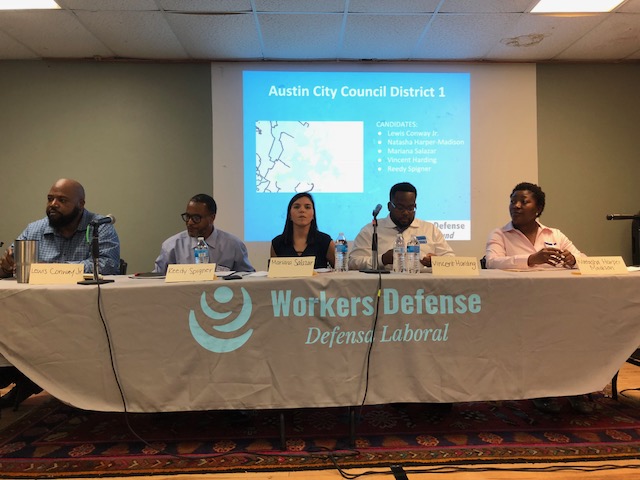
Five candidates are vying to succeed Council Member Ora Houston, who chose not to run for reelection. Houston is the sole African-American on the council. This is a reflection of the continuing decline of Austin’s black population, which shrank from 9.8 percent of the total population in the 2000 Census to 7.7 percent in the 2010 Census, according to the City’s demographics and fell to 7.0 percent of the population in 2014.
Odds are, however, that the District 1 seat will continue to be held by a black council member, because four of the five candidates who spoke at the candidate forum are African Americans.
Lewis Conway Jr., 48, lists his occupation on the ballot application as a criminal justice organizer. Conway was convicted of voluntary manslaughter in January 1994, and sentenced to 20 years in prison, according to records maintained by the Texas Department of Public Safety. In various interviews, Lewis said he spent eight years in prison and 12 years on probation. As a convicted felon, he was initially denied a place on the ballot but the City Clerk reversed that decision, clearing his way to compete. He introduced himself by saying, “I am running so you have the power, so we can build a local workers comp fund.”
Vincent Alexander Harding, 30, is an attorney (graduated from UT Law School in May 2012) and Realtor who formerly chaired the Travis County Democratic Party.
Natasha Harper-Madison, 40, is self-employed. She said she was born and raised in Austin, is married to a firefighter, and “it’s time for people who are not career politicians to step up.”
Mariana Salazar, 37, lists her occupation as public servant. She said she was a community organizer in Venezuela and as an immigrant knows that Austin is not welcoming to everyone. She noted that she is one of the two Latinas currently running for City Council. Her ballot application indicates she has been living in Texas for 11 years.
Reedy Macque Spigner III is 47 and lists his job as a grant monitor. He said he is a third-generation Austinite and dismayed that so many residents have been forced to leave the city. He would like to see more political engagement to solve problems.
All of these candidates agreed that sick leave rules should apply regardless of the size of the business. Harding said “taking care of the sick is a basic human right. We need to protect that.”
Salazar said she is a working mother of two children, one of which had six ear infections last year. “I cannot imagine being a mom who couldn’t be there when they need you.” She said once the sick-leave rules are implemented they need to be monitored and enforced.
Spigner said he is the father of two children and that sick leave is a human rights issue. “I’m absolutely for it.”
Conway claimed he was the only candidate who “fought for” the sick leave ordinance. “We need to look at insurance premiums and family leave as well as sick leave,” he said.
All District 1 candidates agreed that the minimum wage of $15 an hour should be indexed to rise with the cost of living. Salazar said that a “living wage was not the only piece of the puzzle,” and she supported the affordable housing bond and transit improvements. Harding expanded further to address affordable housing for low- and middle-income residents. Harper-Madison supported those things as well as “high quality affordable childcare.”
Candidates were asked how they would help end the school-to-prison pipeline. That problem was addressed by a council resolution in 2017 to create of a working group tasked with finding alternatives to snaring students in the court system.
Salazar said she would seek to overturn state legislation, oppose collaboration with federal immigration authorities, and fund legal services. Harding said he would seek an audit for more accountability and to give subpoena power to the Police Monitor Citizen Review Panel that hears disputed internal affairs cases. Harper-Madison said “we’re still dealing with racism from the 1920s. We have to acknowledge the ugly truths.” Conway said cash bail should be ended and investments should be made in mental health facilities.
District 1 candidate Mitrah Elizabeth Avini, 29, who lists her occupation on the ballot application as a “candidate for Austin City Council” was not at the forum. She filed for a place on the ballot a day later. Twitter records indicate she is Iranian and founder of United Voices, an organization that promotes unity through cultural exchange.
District 3 candidates
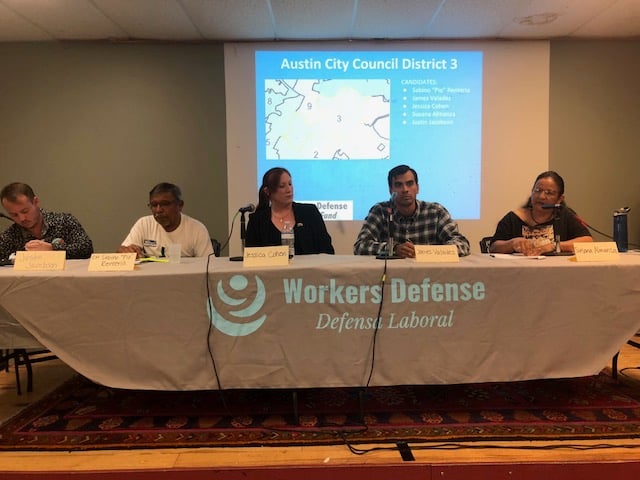
Five of the six candidates on the ballot competing for the District 3 seat held by Sabino “Pio” Renteria came to speak at the forum.
Incumbent Renteria, 68, said he had spent his entire life working for social justice.
Susana Renteria Almanza, 65, is director of the community nonprofit organization PODER (People Organized in the Defense of Earth and her Resources). Almanza is incumbent Renteria’s sister. She filed for a place on the ballot the last possible day, August 20. That set up a rematch. She lost to Renteria in the 2014 runoff by a margin of 60-40 percent.
Jessica Elizabeth Cohen, 47, listed her occupation as a senior network engineer. But in introducing herself she said she chose to run because in 25 years as an emergency medical technician, she was “fed up with the suffering going on in my district,” with people being evicted and deported.
Justin Ray Jacobson, who turns 28 on August 29, is a restaurant manager who said he is a fifth generation Austinite whose issues are land development and transportation.
James Carlton Valadez, 31, listed his occupation as real estate. Renteria appointed him to serve on the city’s Board of Adjustment where his second term will end in February 2019. His term on the Travis Central Appraisal District’s Board of Directors expires December 31, 2019.
All the candidates said they support the Build a Better Austin Pledge. Renteria noted that he had gotten the endorsement of AFSCME (American Federation of State, County & Municipal Employees AFL-CIO) “because I have worked hard for workers here.” He said, “I’ve marched with workers. We passed sick leave.” Cohen said she absolutely supports the program and it should have already been in place. Valadez said he would urge compliance to make sure all employers adhered to the letter. Almanza said, “If I had been on council for four years this would already be in place.”
All the District 3 candidates said they supported sick leave for employees regardless of the size of the business for which they worked. Cohen said, “I work for a small business and they do just fine giving more than the minimum. If my business does that so can everyone else.” Renteria voted to approve the program and said he would continue to fight for workers. Almanza said she had been running a small organization for 25 years and “we have the right model. If someone is sick, someone jumps in to do that job.”
Asked about indexing the $15 an hour minimum wage for inflation, all agreed to do so. Cohen said she’d like to see the minimum be $19 an hour “because the people who work here can’t afford to live here—and that includes me.” Renteria said the cost of a one-bedroom apartment is $1,200 but in his (eastside) neighborhood more apartments are being built and the Plaza Saltillo development will offer 20 percent affordable units. Almanza said, “There is no evidence that high density creates affordability. Homes cost $300,000 in our (Montopolis) neighborhood, families are being pushed out. We need low-income housing for the workers and need to work on legislative authority for a citywide living wage.”
District 3 candidate Amit Gul Motwani, 40, whose occupation is listed as “chief information officer,” filed a ballot application the day after the forum.
District 5 candidate(s)
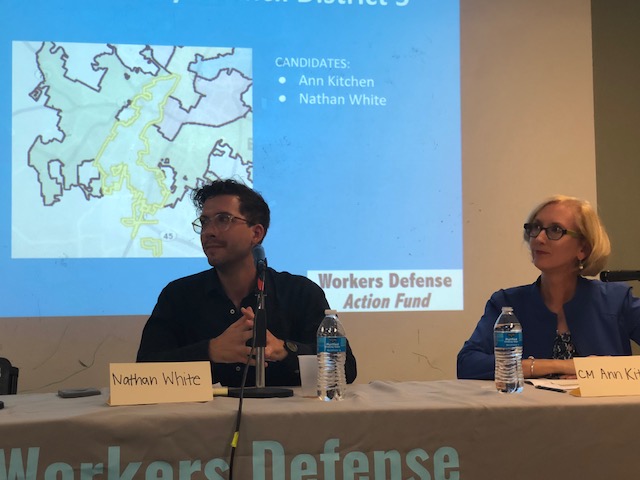
Incumbent Council Member Ann Elizabeth Kitchen was paired up at the forum with Nathan Alexander White. Although he participated in the forum, a day later the city clerk ruled that he submitted insufficient signatures to qualify for a place on the ballot. That leaves Kitchen to run unopposed, a rare situation in council contests. In recent memory the only candidate to achieve that status was Bill Spelman, whose first term ended in 2000. When he again sought office in 2009 he ran unopposed, then drew six opponents in 2012.
Kitchen told the group that she was “excited” to attend the forum, “proud of her work with the Workers Defense Project,” and “proud to have your endorsement.”
She said she supports requiring workers compensation insurance wherever it’s possible under the law and, as a member of the Capital Metro board of directors, supported it for the Plaza Saltillo project.
Kitchen said people need health insurance and she had helped create the TexHealth Coalition to subsidize insurance premiums. Records of the Texas Secretary of State show that she organized TexHealth as a nonprofit corporation in June 2010 for the purpose of ensuring that all Texans have stable affordable healthcare coverage, specifically on affordable programs for uninsured or underinsured small businesses and their employees. Records indicate the corporation was terminated in October 2015. However, Secretary of State records indicate that Kitchen also formed TexHealth Central Texas in February 2009. In an email this morning she said the organization “is alive and well, connecting small businesses and their lower wage workers to low-cost affordable health insurance.” IRS Form 990s on file with Guidestar.org show the organization reported income of more than $403,000 in 2016.
Kitchen said her father was a union steward and she supported Better Builder standards and immigrant families. “District 5 recognizes and values the importance of work people do and supports raising the living wage.”
Kitchen had more than $32,000 in her campaign war chest as of June 30 but no candidate to compete against.
District 8 candidates
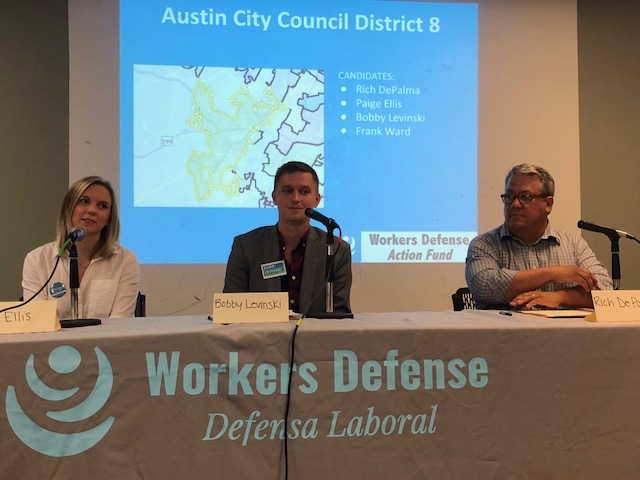
Four candidates are vying to succeed her. All had filed for a place on the ballot well before the forum, but one did not attend: Frank Pelouze Ward III, 36. Ward’s ballot application states that he is a public affairs executive. The Travis County Republican Party issued a press release August 22 to announce it had unanimously endorsed him to follow in Troxclair’s footsteps. The release quoted Ward stating his opposition to “hundreds of millions of dollars in new bond spending….”
Richard Julien “Rich” DePalma, 45, lists his occupation as a business consultant. He is a member and former vice chair of the City’s Parks and Recreation Board, where he serves as Mayor Adler’s appointee. He said he had “worked with cities for decades.”
Robert James “Bobby” Levinski, 32, is an attorney for the Save Our Springs Alliance who graduated from University of Texas Law School in June 2015. He formerly served as an aide to Council Members Jennifer Kim, Laura Morrison, and Kathie Tovo—two of which, he said, were endorsed by Workers Defense. He said he just been endorsed by AFSCME for this campaign.
Paige Johanna Ellis, 34, lists her occupation as “marketing/public involvement.” She told the audience she is a “product of public education” and works as a public involvement specialist for an environmental firm.
Asked if the sick leave ordinance should apply to employers regardless of size, all three candidates answered yes. DePalma added it was important to “fight for local control to make lives better for citizens.”
One question put to candidates suggested the District 8 residents might be too well off to worry about the quality of life issues that lower-income districts may face, such as unemployment and affordable housing. Ellis responded saying “all have concerns, feed our families, keep families together.” DePalma said, “We need to make sure we’re lifting up everybody.” Levinski said, “Ward-style politics don’t work. I worked for two at-large council members. We are only as successful as our lowest paid.”
Each of these three candidates has loaned their campaigns more than $3,000. Both DePalma and Levinski have more than $27,000 in cash on hand as of June 30, and Ellis had more than $12,000, according to campaign finance reports. Ward filed for a place on the ballot after the June 30 deadline and was not required to file a campaign finance report.
District 9 candidates
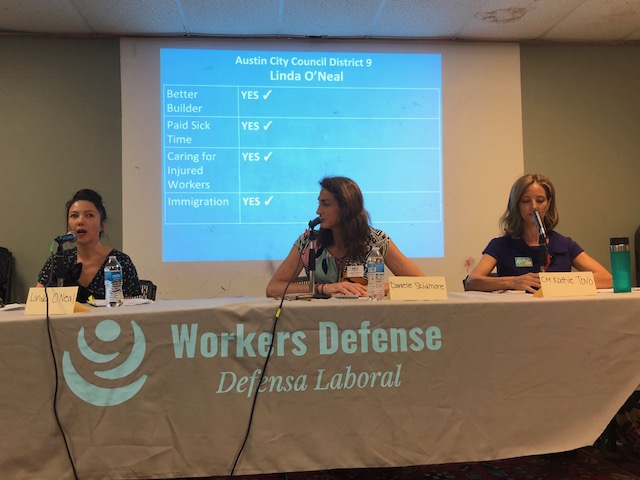
Four candidates are on the ballot in District 9, including incumbent Mayor Pro Tem Kathryne Beth “Kathie” Tovo. As the only holdover from at at-large council days, Tovo had to collect thousands of signatures to qualify because she was term-limited.
Isiah Bradley Jones, a 21-year-old student, did not attend the candidate forum though he filed for a place on the ballot August 9.
Linda O’Neal, a 45-year-old high-school teacher in the Austin Independent School District, said she is an a Vietnamese immigrant. Her ballot application indicates she has been a U.S. resident for 40 years. She sat on the dais with a perfectly behaved small black dog in her lap.
Danielle Marie Skidmore is a 46-year-old engineer who said she is a transsexual mother to a special-needs child. While believing Austin is a progressive city, Skidmore said more work is needed “to be truly progressive and support families and affordability.”
Tovo said it had a privilege to work with Workers Defense Project in both of her terms on the council and had sought to revamp the census program.
Regarding the fact that Texas does not require employers to provide workers compensation insurance, Tovo said she would support challenging state law “to ensure employees have health insurance.” She said the city needed to look at its contracts for the City’s outsourced services, such as custodial work, and bring those employees in-house where they could get insurance. Skidmore said, “It’s a travesty the state doesn’t require workers comp for all” and the city needs to establish a fund to support injured workers. O’Neal agreed, adding that people need to organize to “push the state to honor local control.” She said local businesses need to get incentives to support paying employees a minimum of $15 an hour. “Some say they can’t pay $15 an hour because it would put them out of business, but it should be required across the board.”
All three candidates said they support indexing the living wage to keep up with inflation.
They also all support the sick-leave ordinance that’s now being challenged in court. Skidmore said, “Having earned sick time is a basic human right that should exist for all” but small businesses needed to get support so they can provide that for employees. Tovo said, “I was a proud co-sponsor of that program. It’s critical we hold all businesses up to important community values and employees have the ability to stay home. I’m pleased to see city defending its position so strongly.” O’Neal said the city should subsidize local businesses rather than big businesses so they can afford to provide healthcare and sick leave for employees.
When questioned whether District 9 residents may be too affluent to be concerned about the problems faced by low-income citizens, Tovo said, “I ran for council because I was concerned about working families.” She said her district “has the most homeless in the whole city.” Skidmore said, “Our hearts are in the right place but we’re failing.” She said affordable housing is needed in all neighborhoods and the city should find land to welcome everyone to the community. O’Neal advocated making residents realize that not supporting progressive issues will hurt their pocketbooks in the long run.
In terms of campaign financing, as of June 30 only Skidmore and Tovo had raised any money. Skidmore had nearly $40,000 in cash on hand, double what Tovo reported.
Links:
Build A Better Austin Pledge (1 page)
Third Court of Appeals Case No. 03-18-00445-CV Order, August 17, 2018
Trust indicators:
 Ken Martin has been covering local government and politics in the Austin area since 1981. See more on Ken on the About page. Email [email protected].
Ken Martin has been covering local government and politics in the Austin area since 1981. See more on Ken on the About page. Email [email protected].
Who funds this work? This report was made possible by contributions to The Austin Bulldog, which operates as a 501(c)(3) nonprofit for investigative reporting in the public interest. You can help support this independent coverage by making a tax-deductible contribution.
An alphabetic list of donors who have contributed to The Austin Bulldog since the organization was formed in 2009 and the cumulative amount each person has given through July 31, 2018, are listed on the Contribute page.
Comments are welcome: If you would like to post your reaction to this story, please do so on the Bulldog’s Facebook page.







